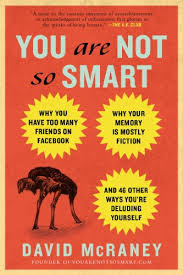Author(s): David McRaney
ISBN: 978-1592406593
APA Style Citation
McRaney, D. (2011). You are not so smart. New York: Gotham Books/Penguin Group.
| open_your_class_youarenotsosmart.pdf |
This book can replace the social psychology chapter. This would serve as a wonderful introduction to the field of social psychology for high school students or others who are relatively new to the field. The book reviews many concepts in social and cognitive psychology and provides the rational for how we often use the information around us to make erroneous decisions. The book is broken into chapters of a few pages and provides some easy demonstrations that would appeal to students and be manageable to use in class. For instance, in the priming chapter the list RKFBIIRSCBSUSSR is presented and the reader is asked to look at the list and remember all of the letters. This is followed by the recommendation to recall the list in ‘chunks’ such as RK FBI IRS CBS USSR which is more effective. The section on confirmation bias discusses the presidential election of 2008. Those who were already inclined to vote for Obama were more likely to purchase books that portrayed him in a positive light, whereas those who did not like Obama purchased books that portrayed him in a negative light. Instead of expanding their views and looking for information that might challenge their beliefs, people instead are far more likely to seek out information that reinforces what they already believe or think they know. McRaney provides some recommendations for alleviating procrastination, which may be helpful to high school or college students. The Availability chapter addresses the work of Amos Tversky and Daniel Kahneman. When provided with a list of names containing both famous and non-famous people, participants generally recalled more famous than non-famous names from the nineteen person list. They went on to assume that the list contained more famous names (it did not) because this was the information they had most readily available. The Obedience to Authority chapter addresses how the icepick lobotomy went on for so long uncontested because people believed that Walter Freeman was a legitimate authority. The unruly psychotic patients that were often subjected to this procedure were considerably “calmer” afterword, providing the results that many were looking for. The chapter entitled, The Just-World Fallacy describes that when we hear about a negative events happening to someone else we often blame the victim. We use this as a protective mechanism because we would like to believe that this same fate would not befall us. This is when McRaney invokes the title of the book, You are Not so Smart. This same rational is discussed in the Self-Serving Bias chapter, in which McRaney describes how we associate positive outcomes with our own affirmative behavior yet make external attributions when something goes wrong. Despite learning time and again that ‘You are Not so Smart’ at least one can rest well after reading the Spotlight Effect chapter knowing that when you wear an awful outfit or sing a terrible rendition of “Living on a Prayer” during karaoke few people will actually notice.
Other Related Resources
Website for You are Not so Smart: A Celebration of Self-Delusion (some items are not appropriate for students)
http://youarenotsosmart.com
You are Not so Smart Quotes
http://www.goodreads.com/work/quotes/16656588-you-are-not-so-smart-why-you-have-too-many-friends-on-facebook-why-you
Your are Not so Smart on Facebook
https://www.facebook.com/youarenotsosmart
Psychological Figures and Concepts
Walter Freeman
Irving Janis
Stanley Milgram
George Miller
Anchoring effect
Attention
Availability heuristic
Bystander effect
Catharsis
Confirmation bias
Conformity
Fundamental attribution error
Groupthink
Hindsight bias
Just-world phenomenon
Learned helplessness
Lobotomy
Misinformation effect
Priming
Representative heuristic
Self-serving bias
Self-fulfilling prophecy
Self-handicapping
Social loafing
Spotlight effect
Split-brain research

 RSS Feed
RSS Feed